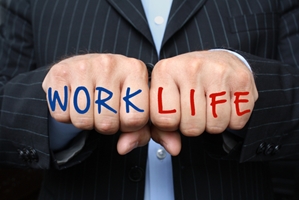
The battle of the bulge is an ongoing one. Health-conscious Americans aim to consistently eat right and exercise regularly in order to stay trim or lose an extra few pounds that they may have put on over the long, cold winter. However, try as they might, the battle is one that many people admit they're not exactly winning.
More than 50 percent of Americans believe they're overweight, according to a newly released poll of full-time workers, conducted by online job search portal CareerBuilder. In fact, almost 45 percent say they're heavier now than they were before they had their present job. Of these, over 1 in 4 say they've put on at least 10 pounds. Hearkening back to the "Freshman 15," some are calling the added weight trend the "Office 15."
70 percent of Americans are overweight or obese
Workers – particularly those whose job functions are mostly sedentary – aren't alone in their weight struggles. Among American adults as a whole, over one-third are considered obese, according to data from the U.S. Centers for Disease Control and Prevention. Having a Body Mass Index of 30 or more is the medical definition of obesity.
However, when you include those who are overweight – a BMI between 25 and 29.9 – nearly 70 percent of Americans are heavier than they ought to be, according to the most recent CDC data.
Obesity is reaching epidemic proportions, playing a role in several other health issues like diabetes, heart disease and hypertension. Though genetics are a factor, most nutritionists say many people are as heavy as they are due to poor eating habits that aren't compensated for through regular bouts of exercise. When workers in the poll were asked what they believed contributed to their weight gain, nearly 55 percent attributed it to sitting at their desks for the better part of the average work day, CareerBuilder reported.
Work-related stress may have a part to play as well, something that not only health scientists have noted, but workers have recognized in themselves. At 40 percent, less than half of respondents in the poll whose jobs were low stress said they felt overweight, the survey revealed. Meanwhile, among those who reported high levels of stress on the job, nearly 80 percent said they were too heavy.
Rosemary Haefner, chief human resources officer at CareerBuilder, said many employers are trying to help staff members struggling with weight achieve their goals.
"Workers are becoming more and more health conscious, but due to higher stress, longer work days and constant multitasking, it is more difficult to find the time to act on wellness goals," Haefner explained. "To make wellness at work a priority, companies should emphasize its importance from top leadership down and focus on engagement, motivation, support and strategy when implementing new programs."
Employee wellness benefits having positive effect
Many of these programs have been grounded in employee wellness benefits. In a bid to help personnel slim down business owners are investing more in wellness programs, according to polling data from the Society for Human Resource Management. Of course, employers also benefit from trimming health care costs.
"Wellness benefits provide employers with a preventative approach that can reduce health care expenses for organizations over the long haul," said Evren Esen, director of survey programs at SHRM. "Rising health care costs also remain a primary driver for how other benefit costs are allocated."
Participating in wellness benefits is paying dividends for some. Nearly 50 percent of people who take advantage of their company gym or wellness offerings say they've lost weight as a result, the CareerBuilder survey found.





